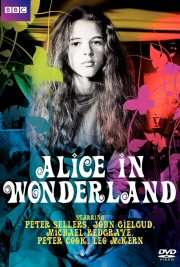- Drama
- 1966
- Buy the DVD
Reviewed by Ross Ruediger
()
ith the impending release of Tim Burton’s “Alice in Wonderland,” here at Bullz-Eye we’ve been inundated with press releases of DVDs for what seem like nearly every version of the Lewis Carroll story ever put to film. It’s all being released or rereleased on DVD due to the awareness of the new film. The one I jumped at – due to a combination of the cast, its reputation, and its unavailability in the U.S. – was this take which was made for BBC television in 1966. To be sure, this version owes more to feature film than BBC TV. Burton may think he’s redefined “Alice,” but he’s wrong. Surely nobody’s ever explored this story the way Jonathan Miller did 44 years ago – nope, not even the porn musical from the ‘70s with Kristine DeBell. Admittedly, I’ve yet to see Burton’s movie, but come on…
There’s little that’s jolly or wondrous about this take, and yet that very approach makes it a wonder to behold. Shot in crisp black and white (which on this DVD is nearly spotless), the story unfolds like some kind of dream from Ingmar Bergman, or perhaps even more like a nightmare from David Lynch. While all the hallmarks of the Carroll story are present, their execution is mostly unexpected. The most glaring omission is the absence of talking animals and childlike wonder. There are no elaborate costumes or walking cards or giant mushrooms here, yet it remains a work of utter fantasia. Alice (Anne-Marie Mallick) sees the White Rabbit (Wilfrid Brambell, Paul’s grandfather in “A Hard Day’s Night”) and follows him into a dreamy state that has no singing flowers, or Tweedledum or Tweedledee – after all, that duo first appeared in Carroll’s sequel, so they’re not part of this action. It’s a loose interpretation of the events within the first book. If you know the story, you really don’t need a recap. If, for whatever reason you don’t know the story, then this DVD is probably not for you. It’s for people who’ve seen version after version of the same story but are seeking something different.
Alice as played by Mallick isn’t even a remotely pleasant child. She never once smiles and delivers all of her dialogue in the drabbest of monotones. She moves from scenario to scenario without wonder, or even a care as to why she’s entered this world. Mostly she just seems to question hypocrisy and nonsense – not out of curiosity, but out of indignation. This Wonderland consists mostly of a labyrinthine Victorian manner and the grounds that surround it. It’s easy enough to throw out buzzwords like “gothic” and “surreal,” and while they’re not incorrect, they really don’t prepare you for the show. Probably nothing would. Most will be drawn to this because of the impressive cast, but don’t expect too much, because this isn’t about acting. It’s about mood and photography (both of which excel).
The great Peter Sellers barely registers as the King of Hearts, while the great Peter Cook grabs the screen and doesn’t let go as the Mad Hatter. Sometimes the show works brilliantly, and then there are moments when it doesn’t, such as in the presentation of the Duchess, played in drag(!) by Leo McKern. Somewhere in between is the March Hare played by Michael Gough, who was Alfred in all of the ‘80s/’90s “Batman” films. (According to IMDB, he also plays a role in the Burton film.) The Hare is a silent, sinister figure, who only offers up words when forced into it. What he’s about will differ from viewer to viewer, but that doesn’t make him any less worth mentioning.
Oh, and the soundtrack is a sitar-driven affair composed and played by none other than Ravi Shankar.
This is the kind of disc that the star system fails. I’ve given it a cautionary three and a half stars. It could be five, but it could also be one. Who’s to say? This is the kind of thing you watch at about four in the morning when you’re at that moment of the acid trip where you think, “What if I never come down from this?” This version of “Alice” will bring you down while keeping you up at the same time. There, now go assign your own star rating.
Special Features: The standout here is the 1965 TV play “Alice,” by Dennis Potter, which, at 70-plus minutes, is equal in length to the main feature. It features Deborah Watling (Victoria from the Troughton era of “Doctor Who”) as Alice Liddell, and George Baker as the Rev. C. L. Dodson, the real name of Lewis Carroll. It details the influence of the real Alice on the man who wrote book and probably deserves a review/exploration of its own. There’s also a lucid if not entirely enlightening commentary track from director Miller. His explanation of why he couldn’t fathom using animal costumes must be heard to be believed, and then either understood or discounted. Regardless, it’s worth a dry listen. An 8-minute version of the very first “Alice” movie from 1903 is certainly worth a look. It’s of course a silent film, yet there’s commentary from some guy. Want to watch it silent? Hit the mute button. Finally, there’s a vintage featurette on Shankar’s work in the movie, and a photo gallery.
You can follow us on Twitter and Facebook for content updates. Also, sign up for our email list for weekly updates and check us out on Google+ as well.













